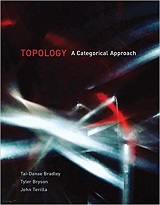
|
FreeComputerBooks.com
Links to Free Computer, Mathematics, Technical Books all over the World
|
|
- Title: Topology: A Categorical Approach
- Author(s) Tai-Danae Bradley, Tyler Bryson and John Terilla
- Publisher: The MIT Press (August 18, 2020); eBook (Creative Commons Licensed)
- License(s): Creative Commons License (CC)
- Paperback: 166 pages
- eBook: PDF Files and Video Lectures
- Language: English
- ISBN-10: 0262539357
- ISBN-13: 978-0262539357
- Share This:

|
A graduate-level textbook that presents basic topology from the perspective of category theory.
The book expertly guides students of topology through the important transition from undergraduate student with a solid background in analysis or point-set topology to graduate student preparing to work on contemporary problems in mathematics.
About the Authors- Tai-Danae Bradley is a PhD candidate in mathematics at the CUNY and the creator of the math blog, Math3ma.
- Tyler Bryson is a PhD candidate in mathematics at the CUNY Graduate Center.
- John Terilla is Professor of Mathematics at Queens College and on the Doctoral Faculty at the CUNY.
- Topology
- Category Theory
- Calculus and Mathematical Analysis (Real Analysis, Functional Analysis, etc.)
- Algebra, Abstract Algebra, and Linear Algebra, etc.

- Topology: A Categorical Approach (Tai-Danae Bradley, et al)
- The Mirror Site (1) - PDF
- Video Lectures (John Terilla)
- A Book Review (Jose Ceniceros)
-
 Simplicial and Dendroidal Homotopy Theory (Gijs Heuts, et al)
Simplicial and Dendroidal Homotopy Theory (Gijs Heuts, et al)
This open access book offers a self-contained introduction to the Homotopy Theory of simplicial and dendroidal sets and spaces. These are essential for the study of categories, operads, and algebraic structure up to coherent homotopy.
-
 Introduction to Topology (Bert Mendelson, et al.)
Introduction to Topology (Bert Mendelson, et al.)
This concise book offers an ideal introduction to the fundamentals of topology. The book's principal aim is to provide a simple, thorough survey of elementary topics in the study of collections of objects, or sets, that possess a mathematical structure.
-
 Elementary Topology: Problem Textbook (O.Ya.Viro, et al.)
Elementary Topology: Problem Textbook (O.Ya.Viro, et al.)
This textbook on elementary topology contains a detailed introduction to general topology and an introduction to algebraic topology via its most classical and elementary segment centered at the notions of fundamental group and covering space.
-
 Topology for the Working Mathematician (Michael Muger)
Topology for the Working Mathematician (Michael Muger)
Topology is a branch of pure mathematics that deals with the abstract relationships found in geometry and analysis. Written with the mathematician, this book provides a user-friendly, clear, and concise introduction to this fascinating area of mathematics.
-
 Topology without Tears (Sidney A. Morris)
Topology without Tears (Sidney A. Morris)
General topology is the branch of topology dealing with the basic set-theoretic definitions and constructions used in topology. The aim of this is to provide a thorough grouding of general topology. It offers an ideal introduction to the fundamentals of topology.
-
 Real Variables with Basic Metric Space Topology (Robert B. Ash)
Real Variables with Basic Metric Space Topology (Robert B. Ash)
Designed for a first course in real variables, this text presents the fundamentals for more advanced mathematical work, particularly in the areas of complex variables, measure theory, differential equations, functional analysis, and probability.
-
 Topology Lecture Notes (Ali Sait Demir)
Topology Lecture Notes (Ali Sait Demir)
This lecture notes lead readers through a number of nontrivial applications of metric space topology to analysis, clearly establishing the relevance of topology to analysis. Covers metric space, point-set topology, and algebraic topology, etc.
-
 General Topology (Pete L. Clark)
General Topology (Pete L. Clark)
This is an oustanding book on introductory topology (point set topology). The book is short. However, it is solid and complete and the proofs presented by the author are surprisingly optimised: very concise but always clear.
-
 Topological Groups: Yesterday, Today, Tomorrow (S. A. Morris)
Topological Groups: Yesterday, Today, Tomorrow (S. A. Morris)
In 1900, David Hilbert asked whether each locally euclidean topological group admits a Lie group structure. This was the fifth of his famous 23 questions which foreshadowed much of the mathematical creativity of the twentieth century.
-
 Algebraic Topology (Allen Hatcher)
Algebraic Topology (Allen Hatcher)
This introductory text is suitable for use in a course on the subject or for self-study, featuring broad coverage and a readable exposition, with many examples and exercises. The four main chapters present the basics: fundamental group and covering spaces, homology and cohomology, higher homotopy groups, and homotopy theory generally.
-
 Basic Category Theory (Tom Leinster)
Basic Category Theory (Tom Leinster)
Assuming little mathematical background, this short introduction to Category Theory is ideal for beginning graduate students or advanced undergraduates learning category theory for the first time.
-
 Categories, Types, and Structures (Andrea Asperti, et al)
Categories, Types, and Structures (Andrea Asperti, et al)
This book introduces Category Theory at a level appropriate for computer scientists and provides practical examples in the context of programming language design. It pursues the more complex mathematical semantics of data types and programs.
-
 Categorical Homotopy Theory (Emily Riehl)
Categorical Homotopy Theory (Emily Riehl)
This book develops abstract homotopy theory from the categorical perspective with a particular focus on examples. It helps consolidate and simplify one's understanding of derived functors, homotopy limits and colimits, and model categories, among others.
-
 Higher Topos Theory (Jacob Lurie)
Higher Topos Theory (Jacob Lurie)
This book presents the foundations of Higher Topos Theory, using the language of weak Kan complexes, and shows how existing theorems in algebraic topology can be reformulated and generalized in the theory's new language.





